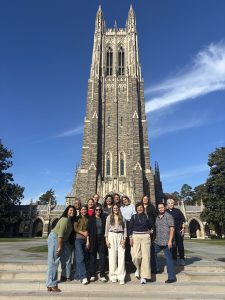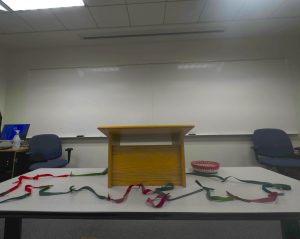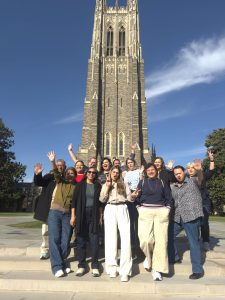Cohort 1: “Intergenerational Preaching & Bilingual Ministry”
June – December 2023
Facilitator(s): Dr. Jennifer Guerra Aldana, Assistant Professor of Christian Ministry and Practice at Reuben Welch School of Theology & Christian Ministry
The first cohort focuses on ministry in intergenerational Hispanic/Latinx contexts. Historically, Hispanic/Latinx churches have been more than just worship spaces for Hispanics/Latinxs in the United States. For the members and friends of the congregation, the church becomes a cultural and social space of mutual support and comunidad. However, as migration patterns continue to change and more generations of Hispanics/Latinxs are born in the United States, how does our preaching adapt to these realities? How do we preach compelling and transformative sermons to first-generation immigrants and the generations who no longer speak Spanish, Portuguese, or the indigenous languages but still identify themselves and fine pride in being Hispanic/Latinx? What does the gospel have to say to the realities of life in the United States for these communities? How can it bridge the gap between those who define home as somewhere far away and those whose definition of home is right here? How do our sermons visibilize the spectrum of what it means to be Hispanic/Latinx?
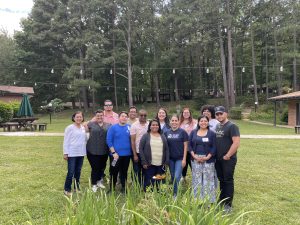
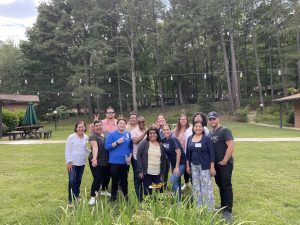
Cohort 2: “Cultural Humility & Trauma-Informed Preaching”
March – May 2024
Facilitator(s): Rev. Dr. Alma Tinoco Ruíz, Assistant Professor of the Practice of Homiletics and Evangelism and Director of the Hispanic House of Studies at Duke Divinity School
Rev. Dr. Hyemin Na, Assistant Professor of Worship, Media and Culture and Chapel Elder of Oxnam Chapel at Wesley Theological Seminary
Rev. Ismael Ruíz-Millán, Executive Director of Connectional Ministries at the North Carolina Conference of the United Methodist Church
This second cohort focuses on preaching that listens to and responds to the world’s suffering, pain, and grief. Historically, there has been a tendency in the Church to ignore trauma and suffering under the need always to portray an image of victory and joy. However, as our world continues to experience devastation, tragedy, and suffering, and as the generation of those who have historically suffered traumatic wounds carry the effect of that history in their bodies, it is essential to stop and ask ourselves how our preaching responds to these realities. How do we preach transformative sermons to communities that struggle daily to ensure their survival and quality of life? What does the Gospel have to say to the realities of life in the United States for those who have experienced traumatic wounds and who experience continuous traumatic stress? How can the pulpit be a safe sanctuary where wounded people can find support for their healing journey? How can our sermons be a means of healing and transformation? How do our sermons address our full humanity by acknowledging our pain?
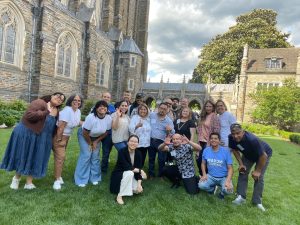
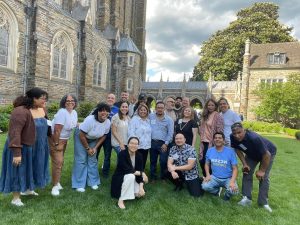
Cohort 3: “Common Home: Preaching, Justice, and Creation Care”
September – November 2024
Facilitator: Rev. Dr. Jerusha Matsen Neal, Associate Professor of Homiletics at Duke Divinity School
Can the creation and covenant of a good God come undone?
The question haunts the proclamation of the gospel in a season of climate disaster, just as it haunts the biblical text. Faithful preachers are called to brave, honest response. Over six online sessions and one residential retreat, learning with a cohort of preachers from around the country, participants will press toward faithful practices of Christian proclamation that bear witness to God’s holy ground of covenantal life. Through small group conversation, sermon workshops, and interdisciplinary educational opportunities, learners will engage in preaching strategies of hope, lament, and justice on behalf of the world God’s loves.
Sessions will be led by Rev. Dr. Jerusha Matsen Neal, Assistant Professor of Homiletics, Duke Divinity School, and will include discussions with Duke scientists from the Nicholas School of the Environment, pastoral care practitioners, and biblical scholars. The cohort will engage Dr. Neal’s new book Holy Ground: Climate Change, Preaching, and the Apocalypse of Place (Baylor University Press, 2024) which draws on the voices of displaced communities in the biblical text and the contemporary context to reframe preaching’s significance for creation’s thriving. In a fraying world, come reclaim preaching’s witness to ties that bind.
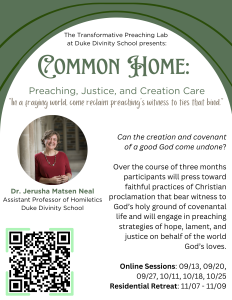


Cohort 4: “Palabra y Mesa: Preaching, Worship & the Sacraments”
March – April 2025
Facilitators: Rev. Dr. Lydia Muñoz, Executive Director of the Plan for Hispanic/Latino Ministries of the United Methodist Church
Rev. Dr. Irving Cotto, Retired Elder in Full Connection of the United Methodist Church
*This cohort will approach preaching and worship from a Methodist perspective and will be offered bilingually (English-Spanish)
Preaching, as the proclamation of the Word, is typically situated within a larger practice of worship. This practice incorporates actions and symbols that draw the congregation closer to God. In worship, participants engage in two primary actions: offering honor and praise to God and receiving a word from God. The purpose of this cohort is to examine the relationship between liturgy and preaching, highlighting their integration as an organic whole rather than treating them as separate elements. Pastors are encouraged to reflect on the following questions: What should pastors consider when preparing sermons and selecting prayers and songs for worship? Why is it essential for the worship service to be interconnected in its entirety? How can the liturgy amplify the power and effectiveness of the sermon? How can the integration of preaching and liturgy foster a transformative worship experience for our communities? By addressing these questions, this cohort seeks to deepen our understanding of how the harmonious interplay between preaching and liturgy can inspire, unite, transform, and empower congregations.
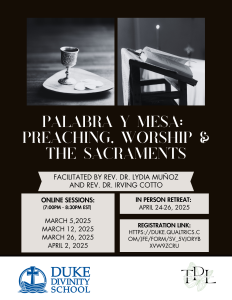
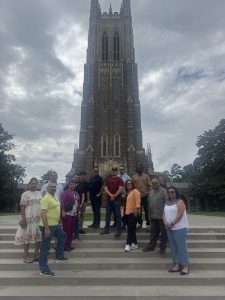
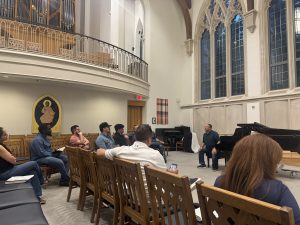
Cohort 5: “Intergenerational Preaching & Bilingual Ministry in Today’s World”
September – November 2025
Facilitator: Dr. Jennifer Guerra Aldana, Assistant Professor of Christian Ministry and Practice, Reuben Welch School of Theology and Christian Ministry
This fifth cohort is a repeat of our first cohort. The social, political and ecclesial reality for Hispanic/Latinxs now is very different from where it was when this cohort was first offered, so we are re-launching it from the perspective of our current reality. The cohort focuses on ministry in intergenerational Hispanic/Latinx contexts. Historically, Hispanic/Latinx churches have been more than just worship spaces for Hispanics/Latinxs in the United States. For the members and friends of the congregation, the church becomes a cultural and social space of mutual support and comunidad. However, as migration patterns continue to change and more generations of Hispanics/Latinxs are born in the United States, how does our preaching adapt to these realities? How do we preach compelling and transformative sermons to first-generation immigrants and the generations that no longer speak Spanish, Portuguese, or the indigenous languages but still identify themselves and take pride in being Hispanic/Latinx? What does the gospel have to say to the realities of life in the United States for these communities? How can it bridge the gap between those who define home as somewhere far away and those whose definition of home is right here? How do our sermons visibilize the spectrum of what it means to be Hispanic/Latinx? How are all these questions answered in an environment of increased violence and unsafe conditions for Hispanic/Latinxs and their community members?
